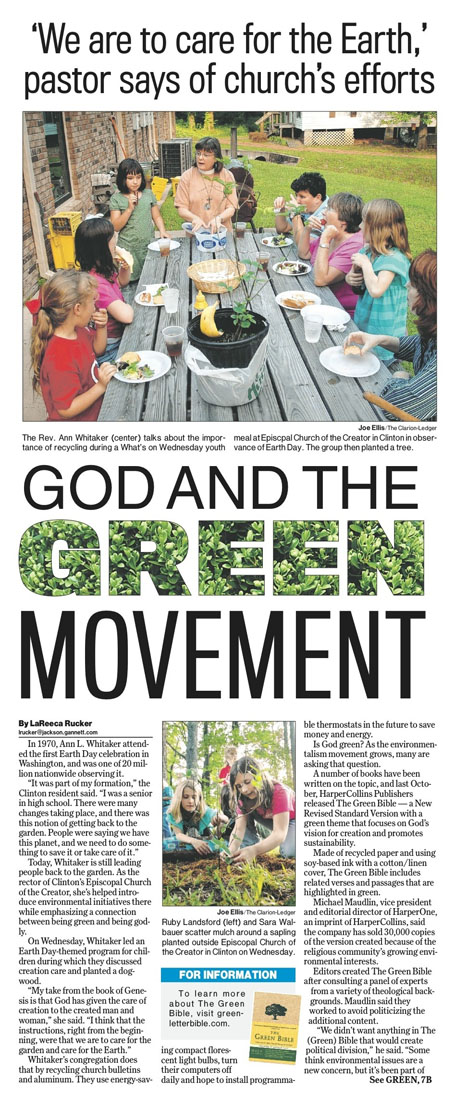 The
In 1970, Ann L. Whitaker attended the first Earth Day celebration in Washington, and was one of 20 million nationwide observing it.
The
In 1970, Ann L. Whitaker attended the first Earth Day celebration in Washington, and was one of 20 million nationwide observing it.
"It was part of my formation," the Clinton resident said. "I was a senior in high school. There were many changes taking place, and there was this notion of getting back to the garden. People were saying we have this planet, and we need to do something to save it or take care of it."
Today, Whitaker is still leading people back to the garden. As the rector of Clinton's Episcopal Church of the Creator, she's helped introduce environmental initiatives there while emphasizing a connection between being green and being godly. On Wednesday, Whitaker led an Earth Day-themed program for children during which they discussed creation care and planted a dogwood.
"My take from the book of Genesis is that God has given the care of creation to the created man and woman," she said. "I think that the instructions, right from the beginning, were that we are to care for the garden and care for the Earth."
Whitaker's congregation does that by recycling church bulletins and aluminum. They use energy-saving compact florescent light bulbs, turn their computers off daily and hope to install programmable thermostats in the future to save money and energy.
Is God green? As the environmentalism movement grows, many are asking that question.
A number of books have been written on the topic, and last October, HarperCollins Publishers released The Green Bible - a New Revised Standard Version with a green theme that focuses on God's vision for creation and promotes sustainability. Made of recycled paper and using soy-based ink with a cotton/linen cover, The Green Bible includes related verses and passages that are highlighted in green.
Michael Maudlin, vice president and editorial director of HarperOne, an imprint of HarperCollins, said the company has sold 30,000 copies of the version created because of the religious community's growing environmental interests.
Editors created The Green Bible after consulting a panel of experts from a variety of theological backgrounds. Maudlin said they worked to avoid politicizing the additional content.
"We didn't want anything in The (Green) Bible that would create political division,"he said. "Some think environmental issues are a new concern, but it's been part of the Scripture all along. You can have all kinds of debates about how you can take care of the Earth, but the fact that you should take care of the Earth is a given."
Many churches in the U.S. now have environmental ministries, and there are some in Mississippi. Eric Livingston, associate minister of Jackson's Meadowbrook Church of Christ, said the church has established a committee called Creation Awareness and Resource Efficient Stewardship.
"The Earth was given as a gift to mankind, and as responsible caretakers, we should definitely be alert to ways we can protect the Earth from abuses," he said, adding that proper use of resources is also a justice issue. Why should some of God's children have better access to clean water or clean air than other children of God," he said. "Regardless of where a Christian comes down on the political issues associated with environmentalism (global warming, oil industry, etc.), we should concern ourselves with creation's preservation and fair distribution of its limited resources. In doing so, we show love to all our neighbors in the world currently, and future generations as well."
Joey Shelton, a senior pastor at Jackson's Galloway United Methodist Church, helps lead Galloway's Green Team.
"One of the days that we celebrate in the United Methodist Church is called Festival of God's Creation, and one of the aspects of that is to think about how we are stewards of what God has entrusted to us," Shelton said. "Our Green Team makes us more aware of ways that we can be attentive to that."
Church members have begun using environmentally friendly light bulbs; recycling paper, cans and plastic; selling reusable grocery bags to cut down on plastic waste; and using mugs instead of Styrofoam cups.
They've discussed hanging clothes on a line rather than using an electric dryer, and they plan to partner with Jackson's Voice of Calvary Ministries and St. Andrew's Episcopal Cathedral to create a community garden.
"We've talked about the theological premise behind all this," Shelton said. "A lot of good work has been done by theologians about what it means to have dominion, and that does not mean exploitation."
Shelton said Christians must rethink the interpretation of Scripture concerning the environment.
"I know a lot of people want to degrade that and say people are tree huggers and things of that nature," he said, "but how we treat the world and each other is a reflection of our relationship with God."
The In 1970, Ann L. Whitaker attended the first Earth Day celebration in Washington, and was one of 20 million nationwide observing it.